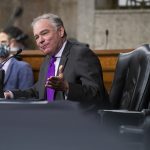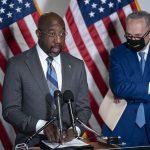Senate Democrats are preparing to make one last push for a deal with Joe Manchin on a huge party-line tax and spending bill. And they say they’ll do it differently this time.
With their 50-member majority poised to confirm Ketanji Brown Jackson to the Supreme Court by the end of the week, Democrats say they will quickly turn to trying to rebuild the bill once known as Build Back Better. But rather than a redux of the slow-motion collapse of that $1.7 trillion plan, they say they’ll swiftly meet Manchin where he is.
“You either do it before Memorial Day or you’re not going to do it,” said Sen. Tim Kaine (D-Va.), who is close to Manchin.
The pivot from confirming the first Black woman Supreme Court justice to reviving their top legislative priority could be the last major move Democrats can pull off before the battle for Senate control takes hold of Washington. Senate Majority Leader Chuck Schumer says the party-line bill’s resuscitation is a “high priority” for his caucus, which needs a palate cleanser after swallowing the bitter pill of Manchin’s rejection in December.
Manchin (D-W.Va.) is open to a smaller bill focused on raising taxes on the rich and big corporations married with prescription drug reform and climate spending, which would be a significant accomplishment if it actually gets to Biden’s desk. He wants roughly half of any new revenues from the bill to go toward deficit reduction, and Democrats say that — if they can pass the package — they’ll sell it this fall as a cost-cutting law that makes the wealthy pay their fair share.
Democrats see Manchin as ready to negotiate more than three months after he went on Fox News and rejected their last plan. But in typical Manchin form, the conservative Democrat is staying coy about how serious prospects are for an agreement.
“Really, I can’t give you a reading on it, if there’s anything serious about this. You have chatter, and we talk to everybody. And there’s nothing serious,” Manchin said in an interview. Asked if that will change, he replied: “It could. After next week, we’ll see, after the judge and all that, maybe things will pick up.”
There’s plenty of skepticism to go around regarding Democrats’ prospects for success. One Democrat who regularly talks to Manchin doubted whether any party-line bill checking his boxes is achievable at this point, citing the mismatch between Sen. Kyrsten Sinema‘s (D-Ariz.) and Manchin’s tax positions. The Arizona Democrat prefers surtaxes on the wealthy and big corporations, not the tax rate increases that Manchin likes.
Mike Casca, a spokesperson for Sen. Bernie Sanders (I-Vt.), put it this way about the chances of getting anything done: “I’d love to be wrong, but I’m not holding my breath.”
After splitting Biden’s agenda into a bipartisan infrastructure bill and a party-line social spending bill, Democrats cut a deal on the former but struggled mightily to unify around the latter. With Republicans in lockstep against reversing or changing any of the GOP’s 2017 tax cut law, Democrats need total party unity in the Senate and can lose only five votes in the House if they want to pass anything.
Still, Democrats insist they already agree on plenty of things, like plowing money into alternative energy and cutting prescription drug prices. Giving up now would amount to a huge wasted opportunity as they get closer to a midterm that could erase their House and Senate majorities, but a prolonged fight that ends in failure wouldn’t go over well either.
“We still have a chance to get something not just significant, but unprecedented, done. And I think we should use every possible ounce of energy we have to do that,” said Sen. Bob Casey (D-Pa.). “April and May is a good window within which to do it. If it went a little later than that, fine. I don’t think this should be dragged out over four to five months.”
For the past few weeks, the Senate has concentrated on a slate of bipartisan goals, from a manufacturing competitiveness bill to shipping costs legislation to a government funding accord. And there’s cross-aisle work underway on reducing costs for insulin, led by Sens. Jeanne Shaheen (D-N.H.) and Susan Collins (R-Maine).
But the easiest way for Democrats to get what they want done this year is by using the blunt tool of budget reconciliation, which allows 50 senators to pass tax and spending legislation — avoiding a Republican filibuster, and the need to deal with the GOP at all. Using their shot at a reconciliation bill before it expires on Oct. 1 could be the last chance Democrats have to get major legislation done for years, should they lose one or both chambers of Congress this fall.
“It makes sense that we do a bill. We have so many pieces that we have 50 votes for. It ought to be possible to cobble those together and create a reconciliation package that passes,” said Sen. Elizabeth Warren (D-Mass.).
Democrats united just over a year ago to plow $1.9 trillion into the fight against the coronavirus, a bill that helped accelerate economic and job growth but also contributed to rising inflation. Over time, rising prices dissuaded Manchin from entertaining more government spending, and Sinema has raised her own concerns about inflation.
That puts Democrats in a far different position than they were a year ago when all the talk about Biden’s “jobs and families” plan first started.
With their time dwindling before campaign season, Democrats have a path to assemble a bill that fights inflation, raises taxes and delivers on their promises about climate change and drug prices. But all parts of the party will have to concede significant ground to get it done; that includes embracing Manchin’s push for short-term fossil fuel production in exchange for alternative energy, as well as completely dropping progressives’ hopes for government expansion.
“I totally think it’s doable. I can’t say exactly what I think would be included, but gosh, since like early January I’ve been saying figure out where you’ve got 50 votes and do it. Joe has been saying he wants to get it resolved,” said Sen. Tina Smith (D-Minn.). “It’s not like people need more information.”
Sarah Ferris contributed to this report.




















